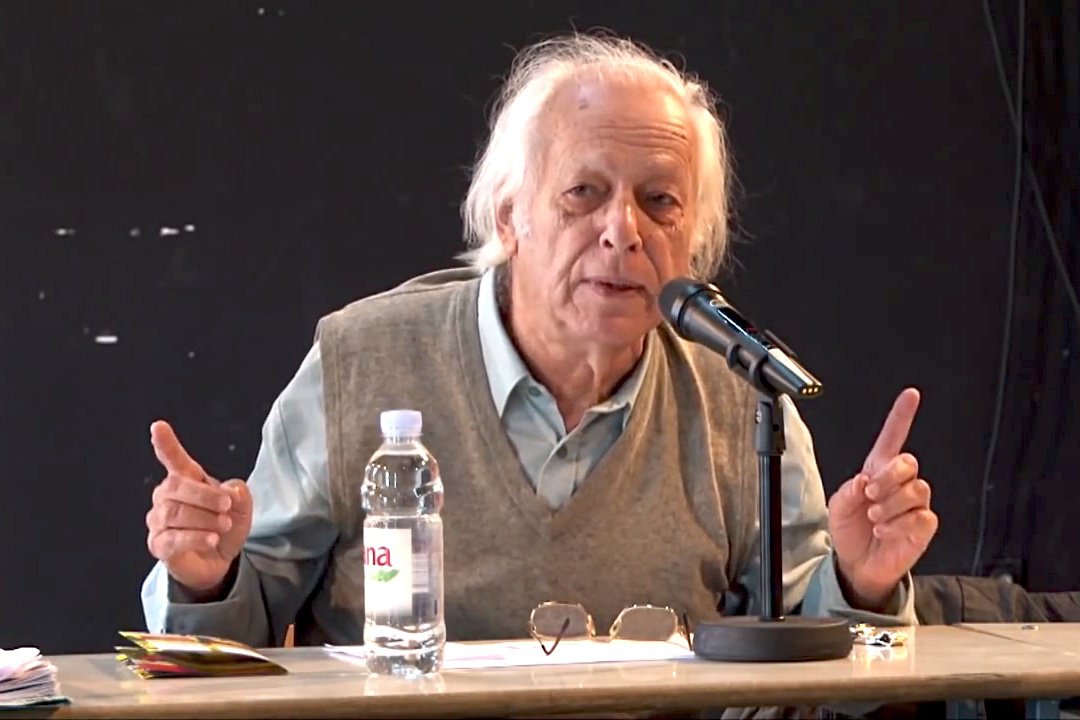Samir Amin dies, a theoretical disconnect of the peoples of the periphery
- Samir Amin just turned off in Paris at the age of 87. Born in Cairo in 1931, the theoretical, academic and activist works carried out since the youth can follow the traces of the contradictory development of the world in the second half of the twentieth century. It promoted the liberation movements of the peoples of the Third World, proposed to them a disconnection to survive in freedom with capitalist imperialism and in recent decades has been one of the main thinkers of the alterglobalist movements.

Last May, a conference was held in Beijing at the Global University for Sustainability, where you can hear on the internet the one-hour conversation that Professor Sit Tsui Jade directed to the teacher, with a cigar in his hand, with a watchful eye and a sharp voice. Samir Amine, who at the age of seventeen became involved in a small Egyptian communist party, continues to fight until he dies well trained.
Woman from the Coptic aristocracy of Cairo, father, French professor, studied politics, statistics and economics in Paris. II. After the World War, like all the communists and leftists in the Middle East, Amin was also shaken by Bandung.
When anti-colonialist movements were booming, in 1955, 29 non-aligned Asian and African countries held the Bandung Assembly in the Indonesian city of Bandung. There were the most important independence leaders: the Nerhu of India, the Nasser of Egypt, the Sukarno of Indonesia, etc.
“Nasser radicalized in Bandung,” Amin would later recognize. He understood that it was a chimera to believe that Egypt was going to be developed by foreign capitals. I think Chinese Zou Linked had a lot to do with his political education. Bandung opened a new stage. What seemed impossible to us was possible: that those nationalist regimes governed by the national bourgeoisies, even if they were not led by the popular classes, which are not against the popular classes, could be anti-imperialists and revolutionaries. Although we didn’t expect it, they dared.”
It is true that Bandung lost his breath in twenty years, but much later his spirit has survived the belief of Samir Amin both in the progressive and anti-imperialist powers that South America has known, and in the alterglobalist movements that have materialized throughout the world.
The economist Jean-Marie Harribey has underlined that Samir Amin has been a first-level theorist and that Hamilton has been an emeritus professor. One leg in Europe and the other in peripheral countries had to live in the three glorious decades that the developed countries called in French Trente Glorieuses, between 1946 and 1975 – II. From the World War to the first major oil crisis, they enjoyed the period of economic growth and improved living conditions.
A group of Marxist intellectuals was in charge of renewing the analyses of imperialism in the 1960s. They brought to light the way in which Western powers steal raw materials from many neocolonial regimes that were in theory independent, condemning them to marginality in the global chain of specialization.
Samir Amine, who, in addition to Marxism, had drunk from the source of structuralism, approached the theory of global accumulation of goods with special delicacy. The result was captured in a mythical book in 1973: Unparalleled development (Le dévelopement inegal).
Amine denied that the problem of poor countries was “delayed in development”, while it showed that the so-called undeveloped countries are by no means the Third World, as they were called at the time, but are linked to an unparalleled global trading system, violently integrated into a global capitalism with well-distributed center and periphery.
As then, today capital seeks not only cheap raw materials, but cheap labor, which allows them to suffer from the peripheries of the world, underdevelopment, bound to general development. “In other words – Harribey – Amine updated and concretized the law of value defined by Marx.”
Appeal to workers and peoples
It was in 1985 that Amine published La déconnexion, also a pioneer. It was then that the International Monetary Fund, the World Bank and the United States Treasury strengthened the neoliberal order across the planet through the so-called Washington Consensus.
With the disconnect thesis, Amine proposed that peripheral countries control the internal accumulation of their goods in order to develop them in a more sovereign way, without depending on the economic, social and cultural interests of the central elites and the multinationals. These countries should devote their production forces to the production of consumer products for their inhabitants, not components for the people of the centre or for the elites of the periphery that are their clubs, and luxury goods.
The Honduran Javier Suazo has highlighted in the Alai medium that in South America there have been many signs of the proposed disconnect of Aminas:UNASUR, ALBA and CELAC, the very concept BRICS (group formed by Brazil, Russia, India, China and South Africa), promoted the World Social Forum in cooperation with the Brazilian President.
A few days before his death, he published his political testament in the historical Afrikaans Asie: “L’indispensable reconstruction de l’Internationale des travailleurs et des peuples”. In the last 30 years it begins with a description of the total centralization caused by global capitalism, explaining how the oligarchy has united all the traditional aspects of the short rope, both right and left, unions and civil society organizations. “The oligarchy has all the political power in its hands and the media church that dominates it produces the necessary disinformation to depoliticize the opinions of the citizens”.
After listing in detail the weaknesses of the responses that the popular forces give to the system, Amine has claimed the need for a new Left International: “We have to get out of capitalism in the systemic crisis, not try to get out of the crisis of capitalism.” The same in Europe: “This German Europe serves the Germanic oligarchy, as we have seen in the crisis in Greece. This Europe is not viable and the explosion within it is already underway.”
Samir Amine shows in his farewell two possible futures. One, the decline of civilization if you let things stick. "With the destruction capacity of the authorities (ecological and military destruction) can happen what Marx mentioned, that the struggles destroy all the parties, that the danger is real. The second option requires clear and organised intervention by an internationalist front for workers and peoples. (...) Comrades, we call history and our conscience. Either we organize together the New Socialist Revolution (learning well the lessons of the old one) or we will have to live in a world where we will see the chaos, barbarism, egoism and destruction of our Earth.”
Macron made his press conference on 12 June to read the elections to Parliament. Above all, it has had the time to repeat that the right end and the left end are both landers exactly the same. Although he has criticised one and the other, he has opened up ideas of charm of the... [+]
I will spare you too many explanations and details, the esteemed reader who looked at this text. The issue is very simple. I'll talk about you, about me, about all of us. I am going to refer to the amazing travellers of this boat that is still floating without direction and ever... [+]
The crisis on the left jumps to Latin America. Until recently, progressive governments could be found on almost the entire map of the region. But things are changing in recent months. The three presidential elections marked a turning point: Daniel Noboa won in Ecuador, Javier... [+]
“And what is the weather she perceives for Thursday?” I asked the feminist militant that she was organizing the A30 strike. “The truth is that lately I’ve had my head in a conflict at school,” he replied with a serious face.
The Vox Solidarity party union called for a... [+]
When analyzing the history of social movements and protest, the most abundant studies are those of the Contemporary Age. Sources are more abundant, conflicts are more abundant, and researchers also share the view of the world of research. That is, as we pass through the sieve of... [+]
French and Spanish leftist parties and movements have a different relationship with the concept of nation and with nationalism. This completely conditions the relationship with the Basque nationalists. But why? The key to the theme lies in the different processes of creation of... [+]
Euskal Herrian "paradigma iraultzaile berria" zabaldu eta garatu nahi duen Kimua ekimen herritarra zenbait herritan aurkezpen bira osatzen ari da. Hala Bedi irratian Kimuako kide batekin hitz egin dute proiektuaren inguruan gehiago jakiteko.





















